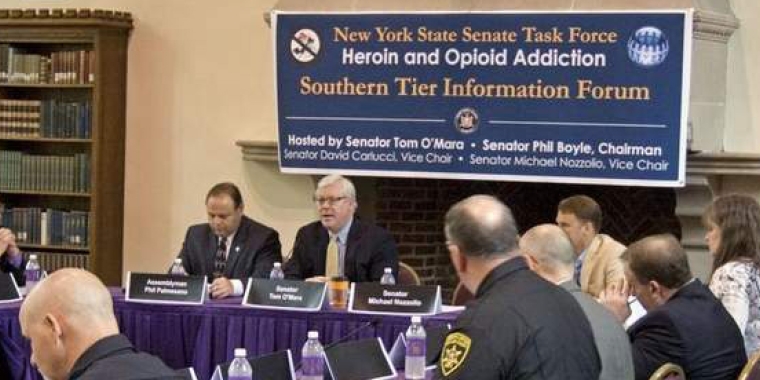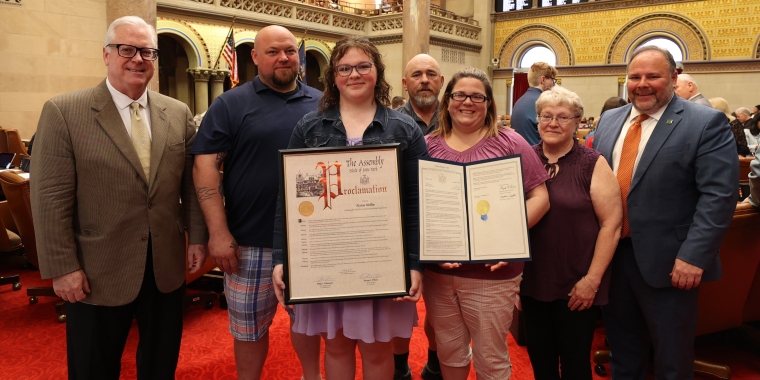
Anti-heroin legislation signed into law, O'Mara co-sponsors actions to 'try to save lives'
Thomas F. O'Mara
June 23, 2014
-
ISSUE:
- Controlled Substances

Albany, N.Y., June 23—Legislation co-sponsored by State Senator Tom O’Mara (R,C-Big Flats) to enact a series of anti-heroin initiatives responding to the growing heroin crisis across the Southern Tier and Finger Lakes regions, and statewide, has been signed into law by Governor Andrew Cuomo.
The bill signing took place at Binghamton University. The legislation was approved by both houses of the Legislature last week.
Today’s action by the governor culminates a bipartisan legislative effort started in early April by the Senate Task Force on Heroin and Opioid Addiction, on which O’Mara served as a member.
“I’m hopeful these actions will save lives and protect more and more of our young people from this devastating and deadly addiction,” said O’Mara. “I’ve been grateful for this opportunity to join legislative colleagues and the governor to achieve a rapid response to one of the most alarming public health and safety threats that we’ve ever faced. We’ve worked together on this comprehensive effort to try to save lives, keep communities safer and prevent more heroin-related tragedies regionally and across the state.”
The new anti-heroin laws will enhance prevention and treatment services, heighten public awareness and education on heroin’s dangers, and increase some criminal penalties to try to deter the spread of the highly addictive drug.
Many of the new measures mirror a series of legislative initiatives first put forth in May by the Senate’s heroin task force, which held nearly 20 public forums across the state including one O’Mara sponsored at Elmira College in mid-May. The task force solicited more than 50 hours of testimony from regional law enforcement officers and leaders, drug addiction counselors, treatment providers, educators, social services and mental health professionals, and other experts – as well as recovering addicts -- about the range of complex challenges posed by heroin including addiction prevention and treatment options, drug-related crimes, and other community and public safety impacts.
O’Mara, however, has been critical of the Assembly Democratic leadership for failing to go all out to combat heroin, especially its continued opposition to enacting stricter criminal sanctions against heroin traffickers.
He pledged to keep pushing for tougher laws to punish heroin dealers and sellers.
“We should be throwing the book at heroin traffickers or dealers whose actions result in a death. These heroin pushers are destroying lives,” said O’Mara. “We can’t ignore tougher laws that can help deter heroin-related tragedies and at least deliver an appropriate dose of justice for victims.”
The new laws co-sponsored by O’Mara will:
> require the state Office of Alcoholism and Substance Abuse Services (OASAS) and the state Department of Health (DOH) to establish the “Heroin and Prescription Opioid Pain Medication Addiction Awareness and Education Program.” The program will utilize social and mass media to reduce the stigma associated with drug addiction, while increasing public knowledge about the dangers of opioid and heroin abuse, the signs of addiction, and relevant programs and resources;
> establish school-based drug prevention programs to add age-appropriate information about the dangers of illegal drug use to junior high and high school health class curriculums;
> provide that naloxone kits distributed through an opioid overdose prevention program must include an informational card with instructions on steps to take following administration, as well as information on how to access addiction treatment and support services. Opioid overdose prevention programs provide those at risk of an overdose, their family members and their friends with naloxone kits and training on proper administration;
> establish the Opioid Treatment and Hospital Diversion Demonstration Program, requiring the development of a new model of detoxification and transitional services for individuals seeking to recover from opioid addiction that reduces reliance on emergency room services;
> enable parents with a child suffering from substance use disorder to receive an assessment for the disorder through the Person in Need of Supervision (PINS) diversion process and thereby access a variety of counseling and treatment services;
> create a “Relapse Prevention Demonstration Program” to allow OASAS to provide referral services for individuals while they’re participating in a substance abuse treatment program, and for nine months afterwards. The community support referrals, aimed at preventing relapses, include educational resources, peer-to-peer support groups, social services and family services and counseling, employment support, transportation assistance, legal services, and child care services;
> promote the affordability of substance abuse services by requiring insurers to comply with federal substance abuse parity laws, strengthening and standardizing the utilization review process for determining insurance coverage for substance abuse treatment disorders, and requiring insurers to continue to provide and reimburse for treatment throughout the appeals process;
> authorize DOH Bureau of Narcotic Enforcement (BNE) investigators to directly access the criminal histories of individuals suspected of criminally diverting prescription medications;
> penalize obtaining a controlled substance by fraud or deceit; and
> make the sale of a controlled substance by a physician or pharmacist a Class C felony.
The full report of the Senate Task Force on Heroin and Opioid Addiction can be viewed HERE.
Share this Article or Press Release
Newsroom
Go to Newsroom


